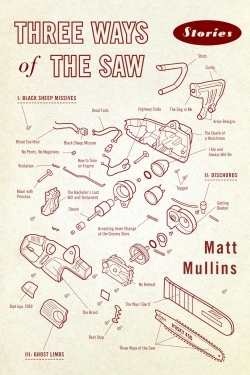Three Ways of the Saw
- 2012 INDIES Finalist
- Finalist, Short Stories (Adult Fiction)
If only the characters in Mullins’ stories had “measured twice, cut once,” like the advice given in the saying “three ways of the saw,” they might feel less ensnared in their current circumstances and freer to lop off what’s no longer working. However, no one has the benefit of hindsight, and so it is that these hard-knocked characters with their jagged imperfections do their best—sometimes, despite themselves.
Mullins experiments—and succeeds—with style, length, and points-of-view throughout. He’s sprinkled flash fiction, brief sketches, and vignettes between traditional short stories, often in such a way that, from one narrator to the next, there’s a tinge of ‘sameness’ to the voice, thereby linking otherwise unconnected pieces. The language itself is vibrant; the pacing often breathtaking; and the meanderings and meditations of the people throughout both comforting and discomfiting. Good reason for all of that: Mullins, in a fresh and unforgettable voice and writing style, has reached across the human condition, exposing the sinew that holds us together, even while it hopelessly, inevitably shreds.
The collection’s title piece, “Three Ways of the Saw,” is in the last of the book’s three
sections: “Black Sheep Missives,” “Dischords,” and “Ghost Limbs.” At this story’s end, J.W. watches Mr. Ashland kneeling at what remains of his honey locust. “That’s what he’s doing as I … drive away … his fingers still circling and
working their way toward the center of that tree’s severed life where he will end by touching the beginning.” Interestingly, the author himself has some experience working for a tree trimming and removal service.
Some characters are literally on the road, their mode of transportation only a vehicle for what else they carry: a dying relationship, betrayal, practiced deceptions, fear. Mullins’ stories bump against one another much as one stitch leads to another. Then there’s the unraveling and the entanglement—messes frequently of the characters’ own making. As the narrator of “No Prints, No Negatives” says on a cross-country trip in his parents’ Winnebago, “Obviously something tremendous and irrevocable had gone wrong with all our lives.”
Despite what’s gone wrong with the peoples’ lives in this collection, it flares with an uncommon energy and wit. Midwesterners—and, especially, Michiganders—will recognize the physical landscape. Gutsy and gritty, these raw-boned stories introduce readers to a brave and excellent writer in Matt Mullins.
Reviewed by
Chris Henning
Disclosure: This article is not an endorsement, but a review. The publisher of this book provided free copies of the book to have their book reviewed by a professional reviewer. No fee was paid by the publisher for this review. Foreword Reviews only recommends books that we love. Foreword Magazine, Inc. is disclosing this in accordance with the Federal Trade Commission’s 16 CFR, Part 255.

